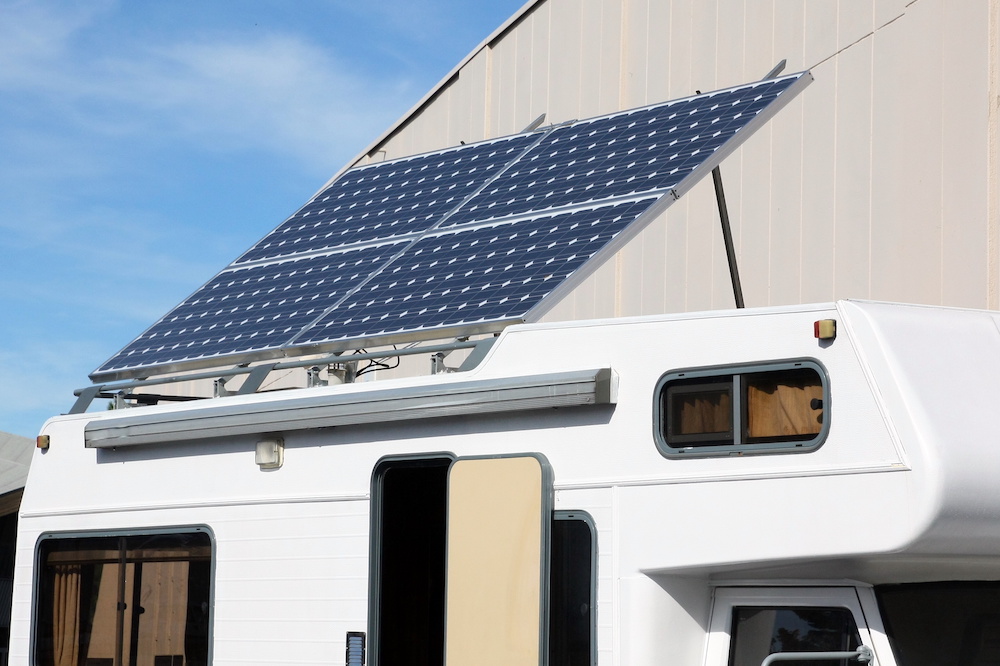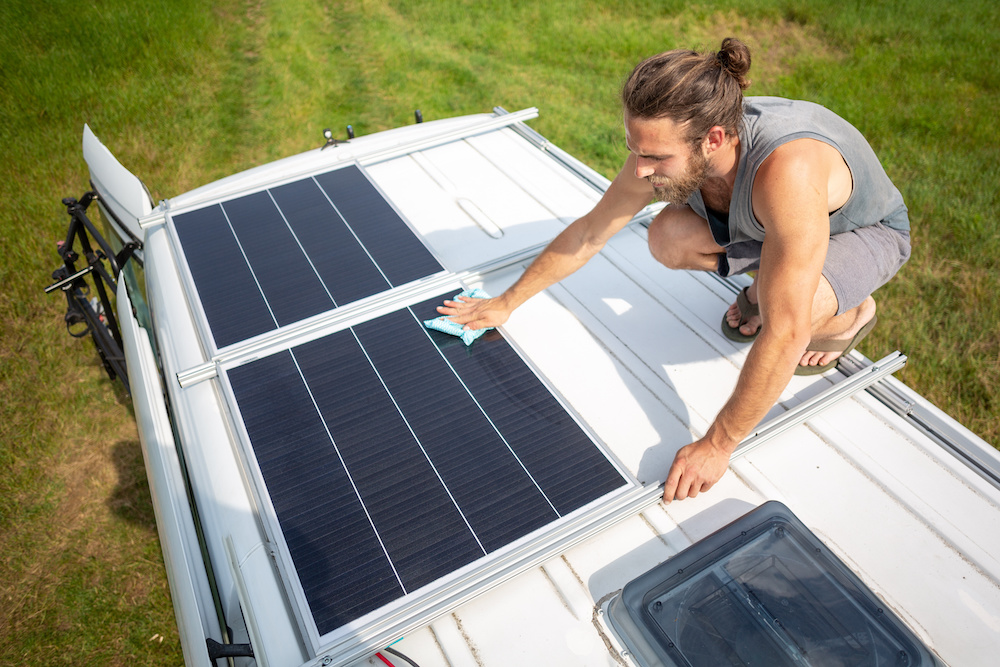Published Date: January 3, 2022
Last Updated on November 29, 2022 by camper front
How much solar power do I need for my RV? Knowing the answer to this question is something every avid traveler should consider.
When visiting off-the-grid locations, as RVs are intended to do, you’re not going to have access to a source of power.
Even while boondocking, you can experience the luxuries of your RV with the help of solar panels.
In this guide, we’ll explore some general rules of thumb to help you ensure you have enough power for all of your travels.
We’ll also look at how much energy your most-used appliances will need.
Table of Contents
How Much Solar Power Can RVs Have?
One of the first things to figure out is your RV’s power limitations.
Fortunately, there aren’t any restrictions to power, as long as you have enough roof space for panels.
Some of the most impressively designed off-road RV solar grids can offer up to 2,000 watts of solar output, comparable to a small generator.
Obviously, the larger your RV, the more power you’re going to need.
A benefit to this is that larger RVs also have far more surface area for panels, often up to 33 feet of space.
RV Solar Power Limitations
Even though there might not be restrictions on how much power you can generate, there are other limitations to consider.
Let’s look at other factors that could influence how you use solar power on your recreational vehicle.
Appliance Needs
By far, the most notable restriction to consider is the amount of power your appliances need.
Many newer RVs are built with high-consumption electrical devices, like washing machines and hefty air conditioner systems.
With these appliances in mind, you might find that you can only use one to two at a time and for a limited period.
For example, if your air-conditioning system and washing machine consume all of your solar power, you can’t run both.
Instead, you will have to tailor the way you use your solar power to ensure you are keeping enough reserve power available.
Cost
When traveling, you’ve likely come up with a budget you want to stick to.
Since RVing is a great way to travel for less, the last thing you want is to spend more than you would with traditional travel.
Solar power energy usage can be less expensive than using hookups, depending on where you’re visiting.
That said, you still need to account for installation costs and how much each panel will be.
If you want more power, you will have to invest more money. Alternatively, sticking to a small budget could leave you without enough sustainable energy.
Carrying Weight
It’s important to remember that although RVs are often considered “beasts of the road,” they also have storage space limitations.
When you add anything to the exterior of your vehicle, it takes away from its towing and cargo storage capacity.
Therefore, the more panels you have, the less you can bring with you on your trips.
When pricing out solar panel technology, you must look at your camper’s owner’s manual.
Keep the weight limits in mind to ensure you have a fully functional vehicle for the whole family.
Otherwise, you will find yourself being overweight for every single trip.
How Much Solar Power Do I Need for My RV?
Every RV you see on the road is different, as each one comes with its own limitations and unique features.
With that said, there isn’t a general answer to how much power your RV will need.
Most owners find themselves looking for solar systems that generate between 50% and 90% of their specific power needs.
Let’s go over a few essential steps you can follow to get more precise calculations for your specific RV.
Although the process can be time-consuming, there’s no doubt that it is well worth the extra effort.

Tip 1: Monitor Your RV Batteries with a Battery Meter
The best way to decide how much battery capacity your RV needs is to take it on a trip and monitor your usage.
While traveling, use all of the appliances you typically use.
As power is consumed, keep track of your usage to know what to expect from your solar panel setup.
This process is the most accurate method, as it will give you a precise number at the end of your trip.
For the most precise measurements possible, invest in a battery meter.
Battery bank monitors are a part of solar power systems, but you can use them even without solar panels installed.
With a battery power monitor, you can track the amount of power your electrical system needs over time.
It will provide you with exact measurements of currents going into and coming out of your RV.
Plus, you’ll be able to track when and how often you need to recharge your batteries while on the road.
Tip 2: Monitor Your RVs AC Power Usage
The next step to keeping track of the power requirements for your RV is to watch its AC power usage.
AC power is used by all of your onboard appliances, from plugging in phones to charge to washing clothes.
For this step, it is a good idea to consider investing in an AC power monitor.
Like a battery meter, AC power monitors keep track of your power consumption over time.
You can then use these numbers to decide how much load your solar panels will need to bear.
Typically, you will connect the AC meter to your power hookup at a campsite and then to your RV’s power cable.
As power is drawn from the hookup, it’s calculated by the AC power meter. It also determines how much of the drawn power your vehicle consumes.
Using these metrics, you will know exactly how much energy your most-used appliances will require.
Tip 3: Keeping Track Manually
There’s no doubt that technology will give you the most accurate readings for hours of power.
It is also the best option if you need an indisputable number before installing solar panels.
However, keeping track manually can be helpful if you have specific power needs.
For example, if you are traveling with medical equipment, you can add extra appliances by hand, like a CPAP machine.
When keeping track of your power usage manually, you will need to figure out the watt-hours for your RV.
From there, you multiply the appliance’s wattage to how many hours per day it has to run.
After calculating the power needs for each appliance, add them to get an estimate of the amount of power you need.
Always double-check your calculations to ensure you’re not underestimating your additional devices, like a ceiling fan, hair dryer, or water pump.
It’s best to overestimate to ensure your system has a little extra reserve power available.
How Many Solar Panels Does My RV Need?
It’s easier to begin building your power system with accurate calculations of the amount of solar energy you consume on your trips.
Deciding on the number of solar panels is the next step, which can be tricky.
Let’s go over some essentials to consider when building your solar power system.
General Power Needs
The first thing you’ll want to determine is the amount of solar array power your RV needs.
This step will give you an idea of the bare minimum number of panels you will need to install.
From there, you can also determine costs and decide whether it’s within your budget.
Environmental Factors
Another crucial part of designing your solar power system is considering environmental factors.
No doubt, weather can significantly impact the power your RV has access to.
For example, if you’re traveling on a bright and sunny day, you will have more solar energy than on a cloudy and rainy one.
You will want to think of a worst-case scenario, such as being stuck in the middle of nowhere at night in a snowstorm.
Does your RV have enough hours of energy to keep you warm overnight with access to essentials?
Also, consider whether you typically travel during the spring, summer, fall, or winter.
The seasons have a significant bearing on how much you use hefty appliances.
For example, heating and cooling are two critical things you will need in the winter and summer.
With these numbers in mind, you can make any adjustments to the number of quality panels you will need.
Backup Power
Another large part of deciding on a solar power system is considering the need for backup power.
You will at least want to have a small generator in all instances.
With this in mind, you could save on some solar capacity, knowing you can split your daily output between the two.
Thinking about backup power is a sure-fire way to ensure you don’t overbuild your system at first.
You will want to start small and slowly transition to a fully solar RV for boondocking and off-road excursions.
Remember, you don’t have to install all of the panels at the same time, as you can add more over the years.
It Depends on Your Needs
If you’re asking, “How much solar power do I need for my RV?” the answer will differ based on your daily output.
Some travelers use minimal daily power, while others prefer access to all their onboard luxuries.
By taking a quick trip and monitoring your average consumption, you can easily decide how much solar power you need.

